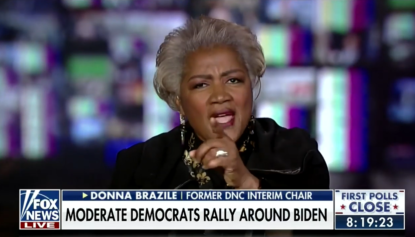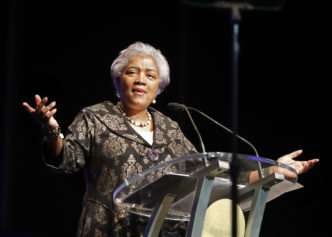The Republicans have talked about becoming an even more inclusive party, but the numbers suggest otherwise.
This year’s Republican Convention included 47 African-American delegates, comprising 2.1 percent of the total. That compares with 1,452 (26.2 percent) black delegates at this year’s Democratic Convention. The Republicans’ convention committees had few black members and no leaders, whereas there are black co-chairs of all of the Democrats’ convention committees, according to a report by David A. Bositis, senior political analyst for the Joint Center for Political and Economic Studies.
Further, Bositis wrote in “Blacks and the 2012 Democratic National Convention,” there are just two black members of the Republican National Committee on a panel of 165—just 1.2 percent—that includes two jurisdictions that are majority or significantly black—the District of Columbia and the Virgin Islands.
By comparison, the Democratic National Committee has 101 black members (22.6 percent).
The roles these members play are equally telling.
“Most of the black Republicans associated with state Republican parties across the country are in positions related to ‘outreach’ to minorities, and those positions are reserved for minorities. Black Democrats are in leadership positions in state parties across the United States with 20 state party chairs or vice chairs compared to only three such positions on the Republican side.”
The numbers are also dismal for elected black Republican officials.
There are 41 black Democrats in Congress and two black Republicans. Among state legislatures, nationwide, there are 622 black Democrats and nine black Republicans, Bositis wrote.
The report is a guide that details black participation in the Democratic Party, as well as shifts in black geographic patterns and partisan alliances in recent years, and black voters’ attitudes on a variety of issues that may affect turnout in the fall.
“Moreover, by better appreciating their own capacity to be influential, black Democrats will be better able to use their influence in pursuit of their public policy interests,” the report said.
There are 346 more black delegates at the DNC this year than four years ago, and more delegates overall. There are fewer black alternates this year, 93 compared to 136 in 2008. There are more black women delegates than men (844 v. 608) and 39 states with more black delegates than in 2008, five with fewer and six whose totals remained unchanged.
Interestingly, Florida – where stringent new voter suppression laws have caused consternation – increased its black delegate total to 49 (98 percent over 2008). North Carolina’s increased by 30 (61.2 percent). And each state has at least one black delegate this year. In 2008, two states had no black delegates and in 2004 six had none.
The party’s credentials, platform, rules and bylaws committees all have black co-chairs. Donna Brazile is DNC vice chair, and the executive director of the Democratic National Committee, Patrick Gaspard, is a black man. Further there are 39 black members of the platform committee, 50 on the credentials committee and 42 on the rules committee.
According to the Joint Center, black voters began supporting the Democrats in large numbers around 1936, when 71 percent of the black vote went to Franklin D. Roosevelt, but African Americans still largely identified as Republican.
It wasn’t until 1948 that a majority of black voters identified as Democratic. That year, 77 percent voted for Harry Truman. Earlier that year, Truman desegregated the armed services and issued an executive order establishing regulations barring racial bias in federal employment.
Still, 39 percent of black voters went for Republican Dwight Eisenhower in 1952 and 32 percent for Richard Nixon in 1960.
Lyndon Baines Johnson supported and pushed for the Civil Rights Act of 1964, which was opposed by GOP nominee Barry Goldwater. A year later, President Johnson signed the Voting Rights Act.
Since then, no Republican has gotten more than 15 percent of the black vote—with John McCain receiving just 4 percent in 2008.
The GOP, once heralded by black Americans as the Party of Lincoln, gradually turned more conservative and pursued policies once associated with Democrats, while the Dems sought a more progressive course.
While some Republicans have argued that African Americans blindly follow the Democratic Party, the Joint Center report suggests that loyalty has been rewarded with key roles within the organization.
Jackie Jones, a journalist and journalism educator, is director of the career transformation firm Jones Coaching LLC and author of “Taking Care of the Business of You: 7 Days to Getting Your Career on Track.”


